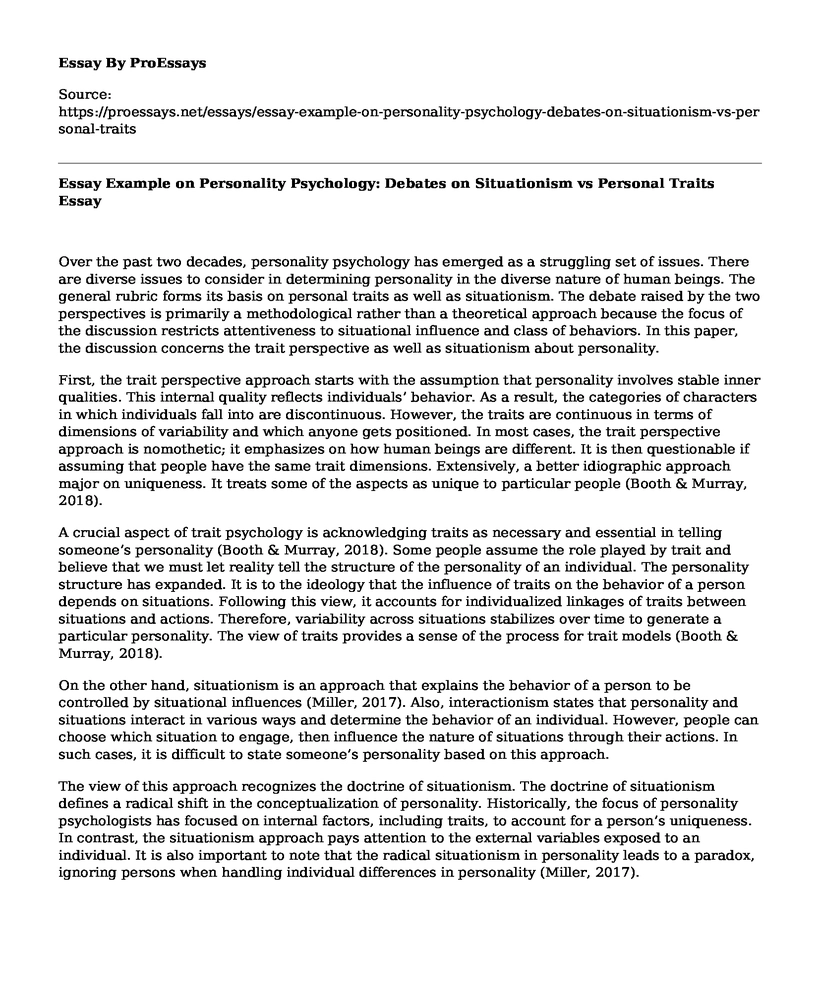Over the past two decades, personality psychology has emerged as a struggling set of issues. There are diverse issues to consider in determining personality in the diverse nature of human beings. The general rubric forms its basis on personal traits as well as situationism. The debate raised by the two perspectives is primarily a methodological rather than a theoretical approach because the focus of the discussion restricts attentiveness to situational influence and class of behaviors. In this paper, the discussion concerns the trait perspective as well as situationism about personality.
First, the trait perspective approach starts with the assumption that personality involves stable inner qualities. This internal quality reflects individuals’ behavior. As a result, the categories of characters in which individuals fall into are discontinuous. However, the traits are continuous in terms of dimensions of variability and which anyone gets positioned. In most cases, the trait perspective approach is nomothetic; it emphasizes on how human beings are different. It is then questionable if assuming that people have the same trait dimensions. Extensively, a better idiographic approach major on uniqueness. It treats some of the aspects as unique to particular people (Booth & Murray, 2018).
A crucial aspect of trait psychology is acknowledging traits as necessary and essential in telling someone’s personality (Booth & Murray, 2018). Some people assume the role played by trait and believe that we must let reality tell the structure of the personality of an individual. The personality structure has expanded. It is to the ideology that the influence of traits on the behavior of a person depends on situations. Following this view, it accounts for individualized linkages of traits between situations and actions. Therefore, variability across situations stabilizes over time to generate a particular personality. The view of traits provides a sense of the process for trait models (Booth & Murray, 2018).
On the other hand, situationism is an approach that explains the behavior of a person to be controlled by situational influences (Miller, 2017). Also, interactionism states that personality and situations interact in various ways and determine the behavior of an individual. However, people can choose which situation to engage, then influence the nature of situations through their actions. In such cases, it is difficult to state someone’s personality based on this approach.
The view of this approach recognizes the doctrine of situationism. The doctrine of situationism defines a radical shift in the conceptualization of personality. Historically, the focus of personality psychologists has focused on internal factors, including traits, to account for a person’s uniqueness. In contrast, the situationism approach pays attention to the external variables exposed to an individual. It is also important to note that the radical situationism in personality leads to a paradox, ignoring persons when handling individual differences in personality (Miller, 2017).
Conclusion
Following the situationism assumption that the main influence of causal variables results from the external to human beings, the question emerges about the nature of the external variable. In other words, what are the dimensions in which a comparison is made in situations? The findings provide three significant categories of external variables. One is environmental psychology that deals with the influence of the physical environment. Experience, thoughts, and actions broadly demonstrate the physical environment. Secondly, experimental social psychology concerns the influence of the social environment. Lastly, behaviorism concerns a systematic position which focuses on the role of stimuli, learning process, and reinforcement in shaping and maintaining behavior (Miller, 2017).
References
Booth, T., & Murray, A. L. (2018). How to factor analysis has shaped personality trait psychology. The Wiley Handbook of Psychometric Testing: A Multidisciplinary Reference on Survey, Scale, and Test Development. https://doi.org/10.1002/9781118489772.ch29
Miller, C. B. (2017). Character and situationism: New directions. Ethical Theory and Moral Practice, 20(3). https://doi.org/10.1007/s10677-017-9791-4
Cite this page
Essay Example on Personality Psychology: Debates on Situationism vs Personal Traits. (2023, Sep 04). Retrieved from https://proessays.net/essays/essay-example-on-personality-psychology-debates-on-situationism-vs-personal-traits
If you are the original author of this essay and no longer wish to have it published on the ProEssays website, please click below to request its removal:
- Protection of Rights and Treatment of Mentally Ill Persons Essay
- Classical Conditioning in Psychology Paper Example
- Essay Sample on Explaining the Beliefs Among Different Societies Regarding Mental Illness
- Identifying the Cause Negative Behavior - Essay Sample
- Essay Sample on Gaining Life Skills Through College: A Positive Experience
- Essay Sample on Maslow's Pyramid: A Guide to Human Needs Hierarchy
- Friends With Similarities and Differences: Examining Personality Traits - Essay Sample







